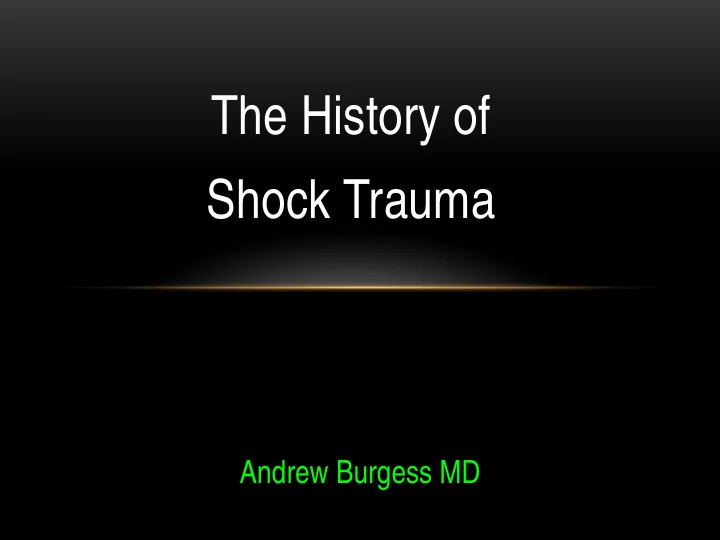

The History of Shock Trauma Andrew Burgess MD
Conflicts: • Consultant to Stryker
Maine Med Private Hopkins ORMC Hospital Employed Albany Med Orlando Regional Medical Center Shock
Injured Patient Traditional Trauma System Treated Patient
Injured Patient Mature Trauma System Harborview Tampa Treated Patient Baltimore etc.
SAM POWERS, MD ALBANY MEDICAL CENTER • Started Trauma Unit in 1968; a cooperative, NIH funded center • R ensselaer P olytechnic I nstitute Partners • G eneral E lectric Research and Development • Clarifying problems of the injured (renal, pulmonary) • Often staffed by an Orthopaedic “Shock Fellow”
R ADAMS COWLEY • A pioneering heart surgeon (MASH) • Shock research 1917-1991 • 2-4 bed unit • “Death lab” • Medivac • 1969 Maryland State Police • Envisioned a Statewide system
R ADAMS COWLEY • 1960’s: Trauma at that time… • Closest Hospital • Often no Doctor, Not equipped for major trauma • University Hospitals • Trauma and ER run by interns • No specialty of Trauma Surgery • Get the patient to the right place at the right time • Shock is a “momentary pause in the act of dying” • The term “Golden Hour” is born
THE OLD MAN • A Pariah • To the established medical hierarchy • Within the University • The National Organizations (ACS etc ) • Challenged the wisdom of the time
ORIGINAL TRAUMA CENTER
GOVERNOR MARVIN MANDEL Critical Alliance Medical School & Hospital Shock Trauma MIEMSS Maryland Institute for Emergency Medical Services Systems
1970’ S- 1980’ S • Development of systems approach • Lobbying State Government • Funding-Design of New Trauma Center • OrthoTrauma participation in design
EARLY, POST-BROWNER ORTHO STAFF • Secure enough to accept each other’s strengths • Put Mission First
Hansen Winquist Brumback Poka • Eglseder • Copeland • Bosse Johnson • Turen Swiontkowski Et al • Pollak • Bathon, Molligan
Maryland Trauma Centers Johns Hopkins Sinai Hospital Shock Trauma Center Bayview Medical Center III I II Johns Hopkins Washington County Hospital L1 Hospital Cumberland Suburban IV Memorial Hospital V Prince George’s Hospital Center Peninsula Regional Medical Center
1989 • New Trauma Center opens • Goal: A National Center of Excellence • Multiple Injuries, Spine and Head Injury
P RIMARY A DULT R ESOURCE C ENTER Shock Trauma (PARC) • More resources than Level One • Dedicated Trauma ORs (6) • Dedicated staff • Trauma Surgeons ( ATLS instructors only) • Orthopaedic Surgeons ( all fellowship trained) • Neurosurgeons • Trauma Anesthesia, CRNAs • Dedicated trauma Imaging • Plain films, CAT, Angio, MRI
Echelons of Care PARC Trauma STC Burn Centers Specialty Level I Eye Referral Centers Hand Level II Head and Spine Level III Hyperbaric H Pediatric H H Perinatal H • Off site Local Emergency Departments • Political allies
EMS Patient Distribution Specialty Referrals 5% Areawide Trauma Centers 10% Local ED 85%
SYSTEMS DESIGNS • Admission by mechanism and vital signs • Trauma unit attached to standard hospital • Medical staff “shunned” by Medical School • Necessitates trauma-multispecialty professional corporation STAPA
Therefore… • Adult trauma patients become a “Purified product” • Admission by mechanism and vital signs • Design placed Resuscitation Area next to ORs • Yields… • High energy, complex musculoskeletal injury • Dedicated resources • Trauma subspecialties financially co-aligned
The Package • Adult patients • High energy musculoskeletal injury Dedicated resources; ORs 6 , ICU beds 72 , etc • • Trauma subspecialties financially co-aligned • Optimum circumstance for developing clinical skills • Few institutional impediments to mission
Center Of Excellence Quality Assurance and Academic Partnerships • Preventable death rates • Outcomes research • Traditional benchmarks • Partnerships with : UMd • University School of Medicine UVa • University School of Engineering JHU • University School of Public Health
Mark Scarboro National Study Center for Trauma and Emergency Medical Systems (NSC) On Call Ellen MacKenzie Sabbatical Jeff Crandall UVA Shock Trauma Hopkins UVA
CENTER OF EXCELLENCE: EXAMPLE • Hazmat Shock Trauma Orthopaedics • Crash Rescue • Structure Collapse • Trench Rescue • Residents from 7 programs • 4 fellows, • Multiple publications • Go team
CENTER OF EXCELLENCE: EXAMPLE Shock Trauma Orthopaedics, 2000 Orthopaedic Leadership in the State • • Maryland Health Care Commission • Baltimore County Fire Surgeon • Medical Director/EMS Washington, DC • Team Docs: Baltimore Ravens
CENTER OF EXCELLENCE Conflict Avoidance • Relationships with traditional institutions • EMS, Fire, Law Enforcement • Competing Hospitals • Within your own system • All made more efficient by a center of excellence, • As are…. • Private practice colleagues • Medical School
NOT SO FAST: REALITY TEST 1999 2017 • Now you’re a super-specialist…. But… • Have you become the musculoskeletal hospitalist?
CENTER OF PREPAREDNESS CENTER OF EXCELLENCE • In trauma care, you are held accountable for how you perform on your worst day • Redundant equipment, design • Always hire better than the boss
Pause
LEAP: L ower E xtremity A ssessment P roject 8 US Level I Trauma Centers 600 Patients with significant lower extremity injury Followed for 2, 6, 10 years
Chronic Pain at Seven Years Factors Influencing Outcome Knee Dislocations with Vascular Injury Functional Outcome of Bilateral Limb Threatening Complications Characterization of Patients Insensate Foot Ability of Scores to Predict Impact of Smoking on Healing Gait Symmetry and Walking Speed Analysis Factors Influencing Decision to Amputate Beneficial Effects of Physical Threrapy 12
Additional 11
metrc LEAP L ower E xtremity A ssessment P roject M ajor E xtremity T rauma R esearch C onsortium 600 patients; Ten year follow-up 8 Level I Centers 26+ articles NIH funded Changed protocols for severe injury
METRC M ajor E xtremity T rauma R esearch C onsortium Josh Gary, MD • Multi Center (13-20) • UT- MHTMC leadership • 110 million dollars+ funding • 16-18 major studies • Musculoskeletal injuries
Funding Burn Center
Andrew Burgess
THANK YOU
Recommend
More recommend